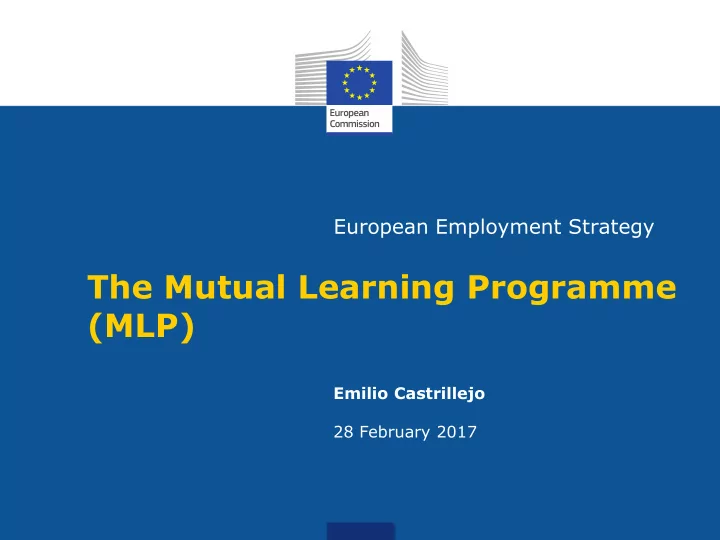

European Employment Strategy The Mutual Learning Programme (MLP) Emilio Castrillejo 28 February 2017
Contents 1. What is the Mutual learning Programme (MLP)? 2. Is there any value in mutual learning? 3. Lessons learnt
1. What is the Mutual Learning Programme (MLP)
What is the MLP? • Mutual + Learning + Programme: Learning: about discussing good (or bad) practice Mutual: from country to country Programme: with Commission support • Supporting activity to the Employment Committee (EMCO)
What is the MLP? – in practice • Several types of learning workshops Conferences Peer learning/Peer review (10 countries) Small ad-hoc events (2-3 countries) • Database of relevant practices (ec.europa.eu/social/mlp) • Ad-hoc actions: information packs , support to discussants at surveillance
Events in 2016 • Feb London: ad-hoc exchange on e-services for employment services • Feb Stockholm: minister level ad-hoc exchange on youth employment • Apr Paris: Peer Review on youth employment • May Madrid: Peer Review on asylum seekers • Jun Dublin: Peer Review on skills forecasting • Jun Brussels: Conference on refugees • Sep Brussels: ad-hoc exchange on youth employment • Oct Berlin: Peer Review on long term unemployment • Nov Warsaw: Peer Review on skills mismatches • Dec Brussels: conference - end of 4-year cycle of the MLP
An example – Madrid 23-24 May • Peer review on integration of asylum seekers • Based on practical experience by Spain • 10 participant countries: AT, BE, CZ, EE, FI, DE, LV, NO, SE and FYROM • For each country: One official appointed by their govenment One independent expert identified by the MLP • Duration 1,5 days: Short formal open Roundtable with NGOs and practitioners on the ground Most time working in informal small groups
Peer reviews: key aspects • Closed doors = Open discussion • Small groups = Real interaction • No peer review, but peer learning • Final report on lessons learnt, but no blame & shame
Another example: End-of-cycle seminar • Key note speakers: • Ms Ylva Johansson, Minister for Employment, Sweden Mr Peter Pogačar, State Secretary, Ministry of Labour, Family, Social Affairs and • Equal Opportunities, Slovenia • Both personally involved in former MLP events • Plenary panels to discuss past work & future actions • Workshops to analyse how mutual learning has worked for 4 topics: • Youth • Skills • Migration • Service delivery and provision (PES, segmentation)
Conclusions of the end-of-cycle analysis • Keep most of the MLP just as it is • Inevitable conflicting goals, e.g.: • Maximize dissemination vs small groups • Top level decissioners vs on the ground knowledge • Still, some lessons learnt and suggestions for the future, e.g.: • Reinforce dissemination after each event • Follow-up events
Other MLP actions • Info packs • Summary of existing information in the MLP library • Selection based on a topic (eg. skills) • Intended particularly to help discussants at EMCO mutual surveillance • Database of labour market cases • 47 cases in the database • Good practice as claimed by Member States • Quality control by the MLP • Repository after peer reviews, source for more peer reviews
2. Is there any value in mutual learning?
My worst nightmare • 1 peer review = 80.000 eur • better than direct subsidies to unemployed people?
Value of mutual learning • For sure you learn: Real practicioners + real experts Small groups Frank discussion Aha! That's how you do it! • Key question: actual transfer into guests policies? Importance of follow up o But impossible to perform conterfactual analysis
3. Lessons learnt
DOs and DON'Ts DO • Choose topics that matter (supply + demand) • Involve real practitioners • Better if you are a community • Ensure a follow up • Plan the transfer of lessons learnt • Keep a repository of cases at a public web site • Involve other mutual learning organizations
DOs and DON'Ts DON'T • Send somebody who is just available • Put the knowledge learnt in a drawer • Expect that others will do something with the results • Expect that others will volunteer to host a workshop
Some [counterintuitive] lessons learnt • Providing funds is not enough • The host country is who learn the most • The countries who needs mutual learning most tend to use it least
Open issues • What is good practice? • Who drafts the papers? • How to monitor implementation? Peer visit report – fast executive summary •
More info & contact Emilio.Castrillejo@ec.europa.eu
Recommend
More recommend